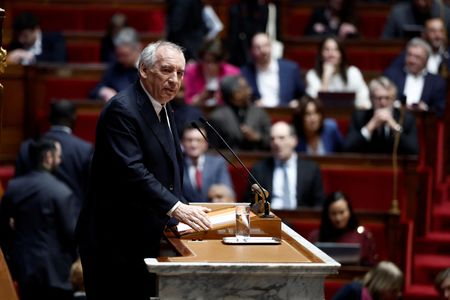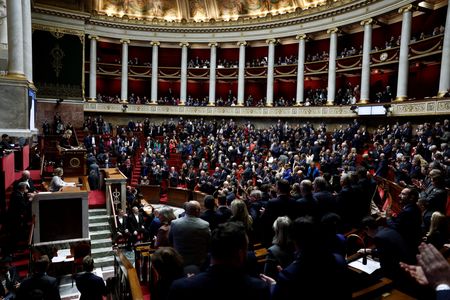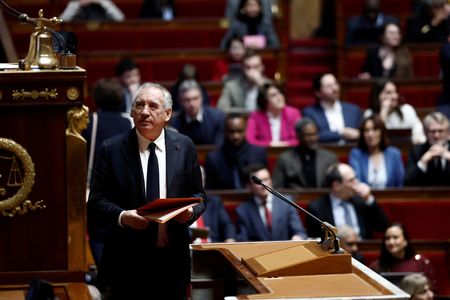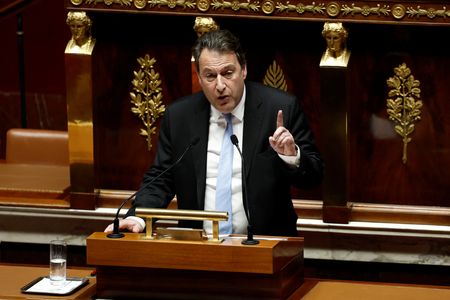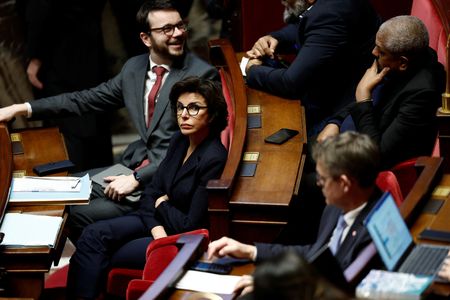By Elizabeth Pineau and Michel Rose
PARIS (Reuters) -French Prime Minister Francois Bayrou on Tuesday opened the door to renegotiating a disputed pension reform in a bid to win over left-wing lawmakers he needs to pass the 2025 budget.
Bayrou’s concession underlined the scale of France’s political turmoil as he prepared to spend his first weeks in office reworking the hard-won 2023 pension reform under pressure from the left, which threatens to topple his government otherwise.
He made the gesture during a speech to parliament after a tumultuous 2024 in which President Emmanuel Macron shocked the nation by calling early elections, only to lose his working majority in parliament just as public finances went off track.
Bayrou, a long-time debt hawk, said responsibility for France’s worsening public finances was shared by many previous governments. But he warned that France’s growing debt pile was a “sword of Damocles” hanging over future generations’ heads.
“Anyone asking for additional spending has taken part in this fatal tango that has taken us to the edge of the precipice,” the veteran centrist told the National Assembly of the euro zone’s second largest economy.
France is under pressure from ratings agencies and financial investors, which have demanded higher premiums to hold French debt since Macron’s decision to call snap elections.
Raising the pension age, considered by many economists an essential move to adapt French public finances to a rapidly ageing society, has been the flagship economic reform of Macron’s second term, and passed despite major street protests.
CONCESSION
Bayrou, who delivered his message to lawmakers in a keynote policy speech setting out his governing principles, proposed to entrust trade unions and employers’ groups with a three-month mission to find a new deal on pension reform.
He said the minimum age of 64 to draw a full pension, the most contested part of the 2023 reform, should not be a taboo.
The new “conclave” exploring a new pension pact will have to propose a deal that is financially balanced. If it can’t be balanced, the current deal would remain in place, he said.
Bayrou’s minority government, formed last month after the collapse of his predecessor’s administration, is trying to secure assurances from some opposition parties – the Socialists in particular – that they will not vote against its 2025 budget, or seek to derail his fragile administration.
The Socialists, who voted down the previous budget proposals in December in conjunction with far-right lawmakers, precipitating the fall of Michel Barnier’s government, have made concessions on the 2023 pension reform a condition for support.
The reform, widely rejected by the left, gradually raises the minimum age for drawing a full pension to 64 from 62 in order to save the cash-strapped treasury 17 billion euros ($17.44 billion) a year.
Philippe Brun, a Socialist lawmaker, said after the speech that his party would discuss in a meeting later whether or not to vote in favour of a motion of no-confidence tabled for later this week.
Two sources from the far-right National Rally (RN) party, which spearheaded efforts to bring down Barnier’s government, said the party would reject a no-confidence motion.
However, Green party spokesman Benjamin Lucas said it was highly likely it would vote against the government.
HIGH STAKES
The stakes are high for Bayrou, who risks a fate similar to Barnier, who was ousted in a no-confidence vote after just three months in office.
Bayrou had earlier assured fellow centrist and centre-right lawmakers, alarmed by France’s deteriorating public finances, that he was ruling out repealing or suspending the reform, according to a source in Macron’s camp.
Ultimately, Bayrou faces few good choices. If he makes concessions to the left to avoid being at the mercy of Marine Le Pen’s far right, he might anger conservative and centrist lawmakers who fear the economic cost of any pensions compromise.
“Francois Bayrou mustn’t lose on his right what he gains on his left,” William Thay, head of French political think-tank Le Millenaire, told Reuters.
(Additional reporting by Dominique Vidalon Sybille De La Hamaide, Geert De Clercq, Sudip Kar-Gupta and Benoit Van Overstraeten; writing by Michel Rose; editing by Toby Chopra, Christina Fincher and Mark Heinrich)

